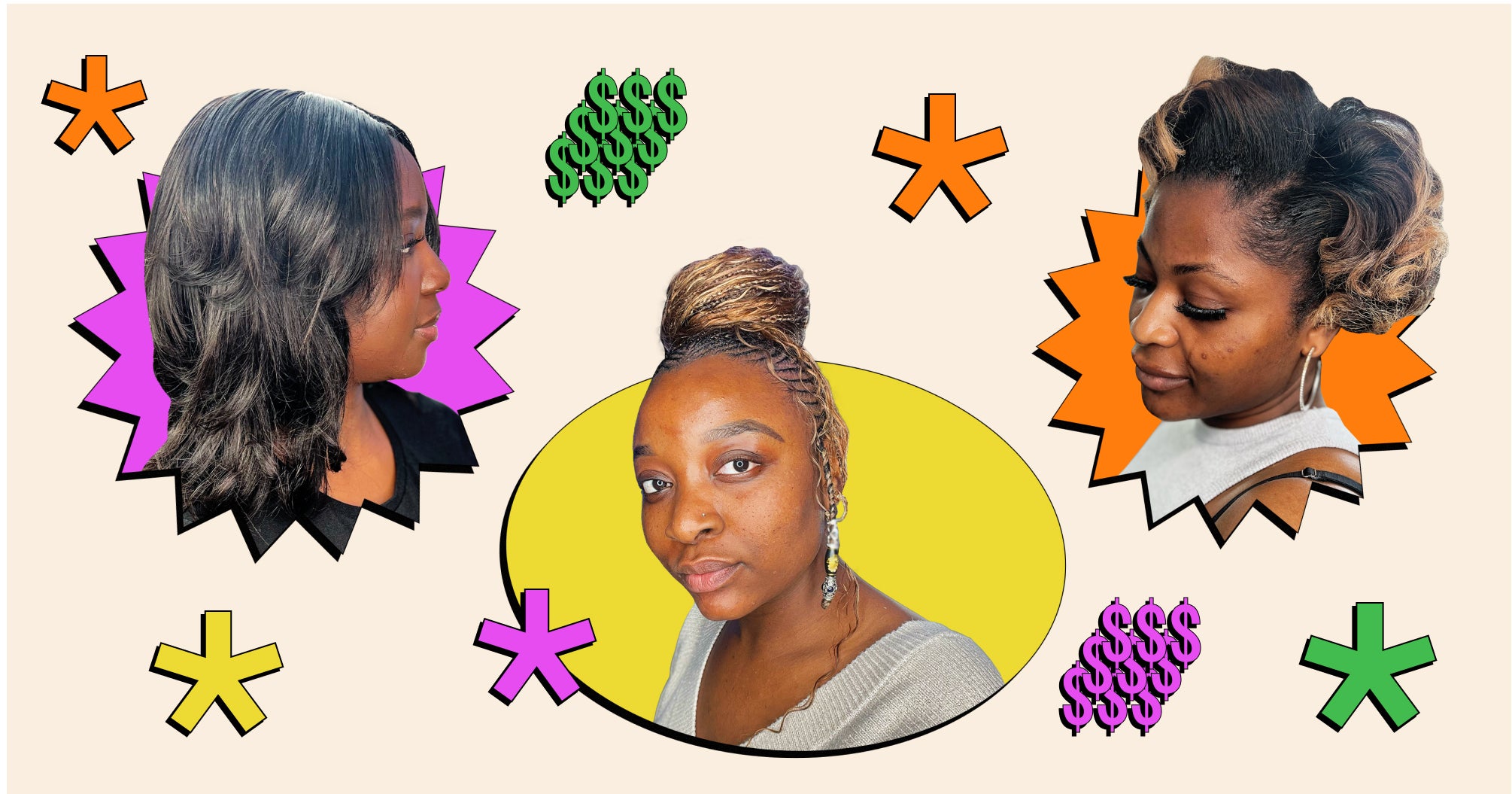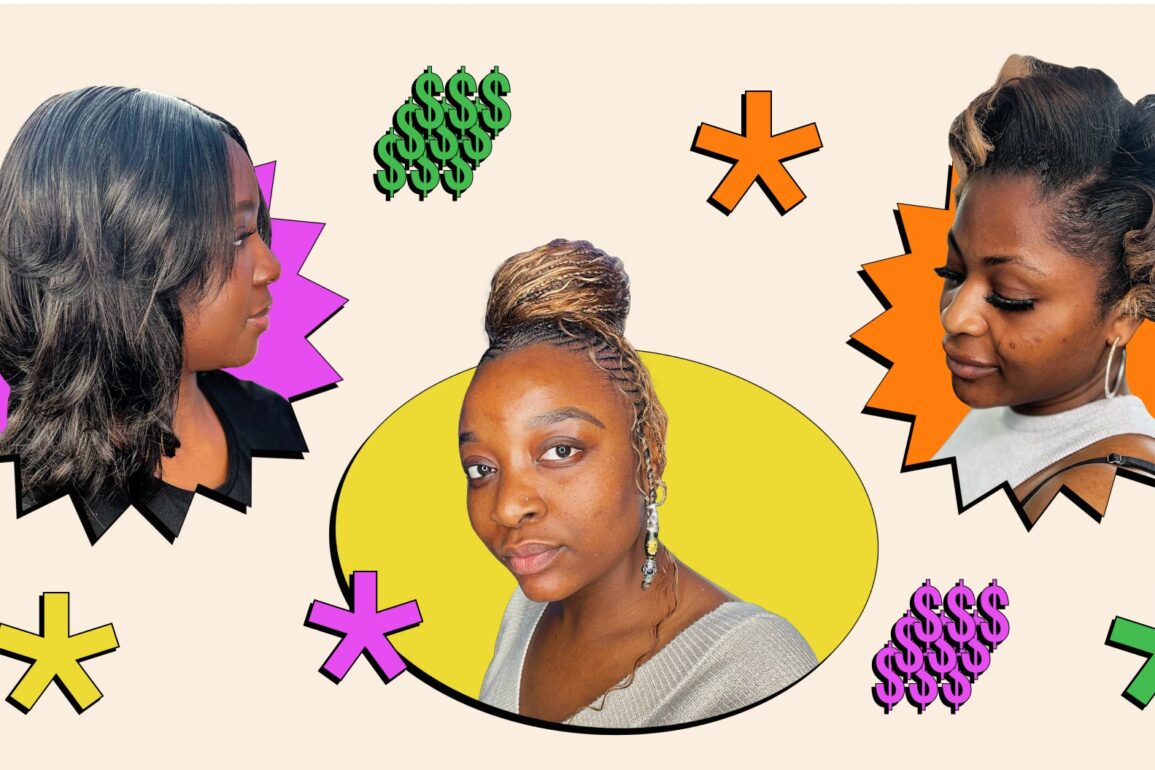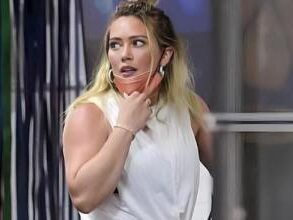
“I showed up for an appointment but the stylist was not there — the salon lights were out!” shared one anonymous Black woman to Unbothered earlier this year. “I had to come washed and blow-dried but [I was] also taxed extra if it wasn’t ‘properly washed’,” revealed another. “One stylist scheduled me at 11 am and didn’t show up until 3 in the afternoon.” Whether on Black Twitter (X) or in the contents of my WhatsApp friendship groups, debates about the standards of Black hair salon services and Instagram hairstylists are increasingly rife. Black customers are routinely reporting “extortionate” costs for braids, weaves and even simple wash and blow dries, as well as inordinate add-on fees — from extra charges to detangle 4C curls to even a hair parting charge — that are driving up the overall costs of much-needed Black hair care services. “Bring your own hair [extensions], blowout your own hair or it’s an extra fee…” tweeted one exasperated customer recently, “… if it’s 4C type of hair it’s an extra $25, if your natural hair is too long it’s an extra $30, if you want to mix colors it’s an extra $40…like, it’s nonsense.”
Between recurring debates about “£1000 braids” and the sheer absurdity of a “4C hair fee,” how exactly did we get here? Unbothered has been paying close attention to cost disparities across Black hair products, hair salons, braiders and hairdressers in the UK, US and Canada to understand what’s driving some of the bloated pricing structures. Much like their customers, Black salon owners are very vocal about the high expectations (and demands for lower prices) for the essential and luxury services they provide. In a time of financial austerity — with energy and living expenses rising exponentially since 2020, when many salons were forced to close, severely impacting the livelihoods of people globally — do we fully understand the true costs of running a Black-owned business in 2023?
Transparency is needed across the board. So, let’s talk about it. How much should you pay for a weave? What is the need for a detangling fee? Is £1000 (approx $1500) ever a reasonable price for braids? Unbothered reached out to a small group of Black hairdressers and salon owners in the UK, US, and Canada to get a clearer purview.
80% of the hairdressers Unbothered surveyed said their services included a wash or trim. When it came to popular hairstyles such as medium-length box braids with synthetic hair, just 40% of the salon owners we spoke to said they charge over £300 ($300), while the rest ranged between 100-250 pounds/dollars. 60% charged 200-300 pounds and/or dollars for traditional sew-in weave with minimal leave-out, while the majority charged between 100-150 pounds/dollars for a silk press. All of the salons offered hair extensions/bundles with braids and weave services. The most affordable service the salons provided was a wash and blow dry, ranging as low as 50 dollars/pounds.
Interestingly, regardless of location, Black salon owners shared similar pricing structures when it came to extra charges — booking fees, late fees, detangling, and hair length fees were witnessed from Manchester, England to Toronto, Canada. When it came to additional service fees, 60% of the Black hair salons surveyed had a late fee policy, with 80% of those hairdressers charging up to 25% of the original booking fee — only one of the hairdressers we spoke to enforced a late fee up to 50% of the original service price. More than half of those surveyed said they did charge customers a hair-detangling fee.
What do Black hairstylists have to say about their prices?
“The price that you’re paying is reflective of the service you should expect,” shared hairstylist Yewande, owner of Yewande’s Braids salon in Manchester, England. A braider for more than 10 years, Yewande began her business in 2019 before opening her first salon in 2020 during the pandemic. “For me, braiding is a luxury. It’s not something you have to have. It’s not essential and it’s very skill-based. It takes a lot of time. It’s very time-consuming and physically consuming. If you want braids, I feel like you should pay for them.”
It’s hard not to think of braids — or any Black hairstyle for that matter — as anything but an essential and an absolute need. I don’t need to explain to Black women why Black hair salons are so integral to our communities and how we confidently navigate the world. I’ve discussed at length the impact of hair and our identities; whether we’ve needed help to assimilate in white spaces or embrace the truest versions of ourselves. To call Black hair salons safe spaces for our self-expression may be an understatement.
However, it’s also important to stress how vital Black beauty salons, products and hair care have been to help foster Black entrepreneurship, financial security and prosperity throughout history. When Madame CJ Walker revolutionised Black hair care by introducing the “Walker system” and products that would radically improve hair hygiene for Black women in 1900s America, she became the first Black self-made millionaire. In 1950s England when Trinidadian pianist, Winifred Atwell, opened one of the first Black hair salons in the UK for the underserved Windrush community in Brixton, she inspired generations of Black hair stylists to do the same for the area to this very day. Entrepreneurship in the Black hair space isn’t new to Black women — this is how we’ve always gotten the bag. And it seems nothing’s changed in that respect. Social media is breeding a new generation of career hairstylists who are building businesses in their homes to styling celebrities. Prices are going up with the demand.
“There is a difference between me, for example, and my Aunties who are braiders because for them [becoming hair stylists] was a survival thing. They were immigrants who came [to the UK] in the early 90s and 2000s,” Yewande continues. “So they would just braid people’s hair very cheaply, so they could make a living,” she explained. Yewande learned much of her braiding skill from the women we all affectionately call “African Aunties”. Whether in the UK or the US, their salon chairs remain filled with returning customers and their prices have always been affordable. Last year, Unbothered spoke to African women who came to England in the 90s who claimed “braiding was their lifeline” when surviving in a new country. Today many of the same braiders found themselves competing with a new generation of Instagram braiders offering new styles at much higher prices. As a result, they have also had to pivot — from marketing on TikTok to embracing new techniques.
“[Compared to my aunties] I’ve decided to go and study haircare and make this a [official] skill. And I’ve decided that this is a career for me,” says Yewande. “So it’s a different path, even though we’re doing the same thing. And yes, I should be able to live quite comfortably doing something that requires such a skill and is so time-consuming as well. I understand where the outrage [about prices] is coming from. But if you start to break down the reasons for costs, you realise that it’s not as bad as it sounds.”
But should Black folks ever pay £1000 for braids? Yewande immediately knew I was referring to the viral video of Black British influencer, Patricia Bright, who revealed she pays £1000 to get her braids done at home by an accomplished stylist. There was genuine outrage on social media. “Simply speaking as someone who can and used to braid hair… There’s not a set of knotless braids that are worth $1000,” someone tweeted in response to the backlash. “They should be no more than $400 (IF your braider is supplying the hair, which most experienced [braiders] do.. not IG influencers).”
For transparency, Bright had asked for 100% human hair extensions and long, waist-length micro-braids — a style that typically would cost more than the average box braid style with synthetic hair. “If a stylist says her cost is £1000, you have to consider the raw materials that go into the process. From what I know about [Patricia Bright’s stylist], she has exceptional skills as far as braiding, the braids last a while, not to mention the actual hair extensions she used for human hair extensions which are very premium and expensive.”
It’s entirely understandable to expect that premium and expensive services will be, well, premium and expensive. And, if someone is willing to pay £1000 for braids, who are we to stop a Black woman’s bag? Some argue that there is resistance to paying the premium for sought-after Black skills and services, while others believe that the capitalistic aspirations of Instagram hairstylists, with huge social followings, have been placed above community needs. I believe that it’s two-fold.
Like many other businesses, Black hair salon owners (mainly women and self-employed) have battled through a challenging few years trying to stay afloat amid COVID and a global financial crisis. In 2021, it was reported that Black hair salons, struggling with rent prices and debt, were decimated as a result of the pandemic and frequent lockdowns. As R29 UK reported at the time, the National Hair And Beauty Federation estimated that of the 40,000 salons in the UK, around 5,000 closed for good. And Black British hairdressers were considered as some of the worst impacted. While the beauty industry is reportedly “bouncing back”, to survive stratospherically high energy prices most hair and beauty businesses have “put up their prices or are planning to in the near future” — Black hair salons are, of course, no different.
While price-hikes are inevitable in current times, what does this mean for Black customers who are already struggling with the cost of living crisis? Black haircare takes a unique skillset (and a lot of time investment), but there are far fewer available Black salon options than people with straighter hair types. It means choices for hair care are either paying the high costs or becoming skilled kitchen beauticians. In the UK, there is a distinct lack of textured hair specialist salons across the country. According to a recent survey by Treatwell, the UK has just 314 Afro-hairdressing salons out of almost 45,000 registered hair and beauty salons. It was only in 2021 that all salons were required to offer services for people with textured hair — but how exactly this is being enforced is another question. Meanwhile, in the US, African American women are said to spend the most on hair care each month with “reports claiming 21% spend more than 25% of their monthly budget on hair care compared to only 5% of Caucasian women”. African-American women have to travel the furthest to get to a hair salon that really caters to their hair type.
“I think it’s understandable that people are upset about the rises in salon prices,” says Yewande, empathetically. “Many of our customers have gone through furlough and a reduction in wages and more since the pandemic. But then that affects our industry as well,” she explains. “During the pandemic, [salons] were not classified as an essential service, so we were the first to shut down [during lockdown]. And even then there were overhead costs that still needed to be paid for whether you had staff in already had clients in or not.”
Has there been a decline in customer service?
Black women’s spending power is great and widely documented; whether in the US or the UK, we pay more for hair products and services alike — however, frustratingly, how much we pay for our hair care doesn’t always translate into the customer service we receive.
All the hairstylists Unbothered spoke to claimed that their customer service was one of the main reasons people came through the door. “I’ve created a safe, open environment that allows my clients to be able to share and be themselves. I educate my clients on how to take care of their hair and maintain healthy hair,” claim stylists at New York’s Wild Flower Salon. “I’m professional and engaging. I show my personality on my socials. I’m also innovative and paving the way for UK braiders,” shared Lauren Parchment owner of MCR Braids in Manchester.
Yet, as many Black women have experienced, great customer service goes beyond good decor and a great playlist. As mentioned earlier, Black hair salons — whether in a traditional salon space or at a home studio — are safe spaces for Black women, especially those of us who may have experienced hair discrimination or have had conflicting feelings about their curls. However, in recent times, many Black women with 4C hair are reporting having to pay extra to have their hair done and in some cases meeting hostility simply because of their hair texture. It seems unconscionable as a Black hairstylist, offering Black hairstyles to Black customers, that you charge extra for 4C hair types. For Unbothered, this is the ultimate salon red flag.
“My salon largely deals with women with 4C hair so it’s not something we do in our salon,” says Yewande regarding the charges. “But I’ve heard of people who say they don’t take on 4C clients, but then like you mentioned, they tend to be the Instagram stylists…”
“Because if you know what you’re doing, if you’re educated to the level to where you can detangle 4C hair and work with it very comfortably, then you shouldn’t be charging people extra for something that naturally grows out of their head. If you’re a hairstylist then you should be able to accommodate different textures.”
But what about charging for the length of your hair? Or the thickness? Are these really reasonable fees? “I don’t have a problem with [a stylist] charging more because of the length of the hair if the process will take longer, but then it shouldn’t necessarily be because of the natural texture of the hair,” continues Yewande. “These are two different things. So for example, if I’m doing mid-back length braids, and it takes me six hours, but a waist length, if it takes eight hours, of course, I would want you to accommodate for putting in those two extra hours.”
Black hair salons are integral and valued community spaces. But also in-demand businesses. It’s important to reinforce the necessity of putting money back into Black-owned businesses like salons. The reality is that salons are becoming much more of a luxury that far less can afford.
This post was originally published on this site be sure to check out more of their content.









